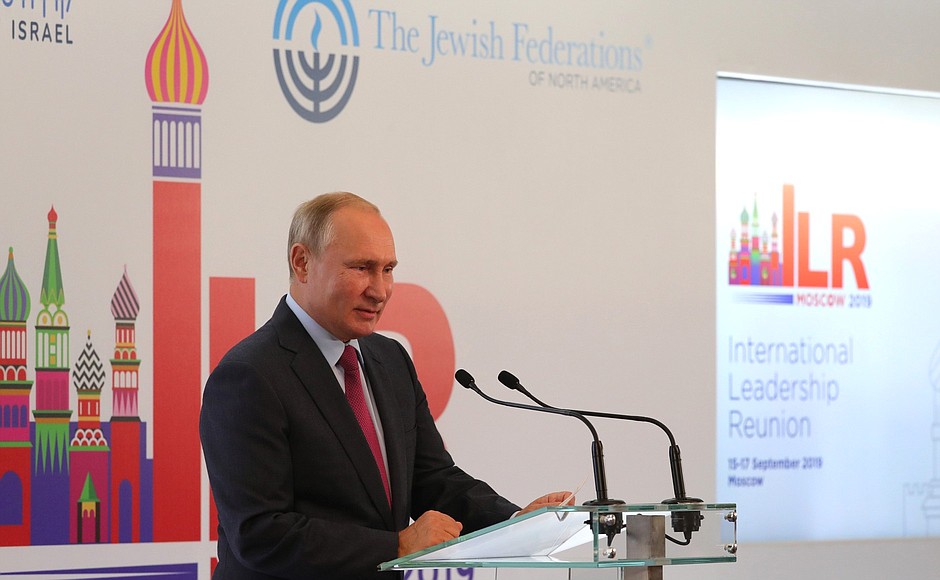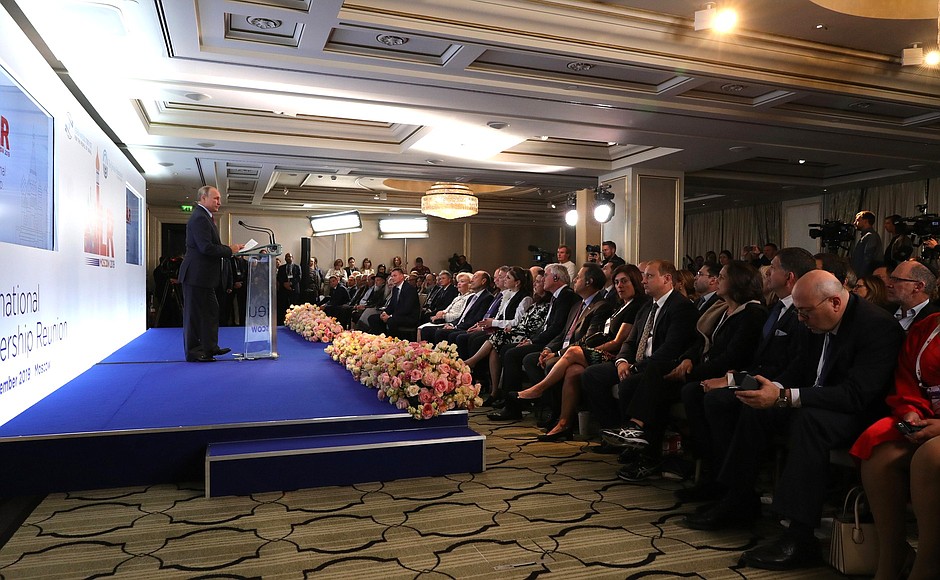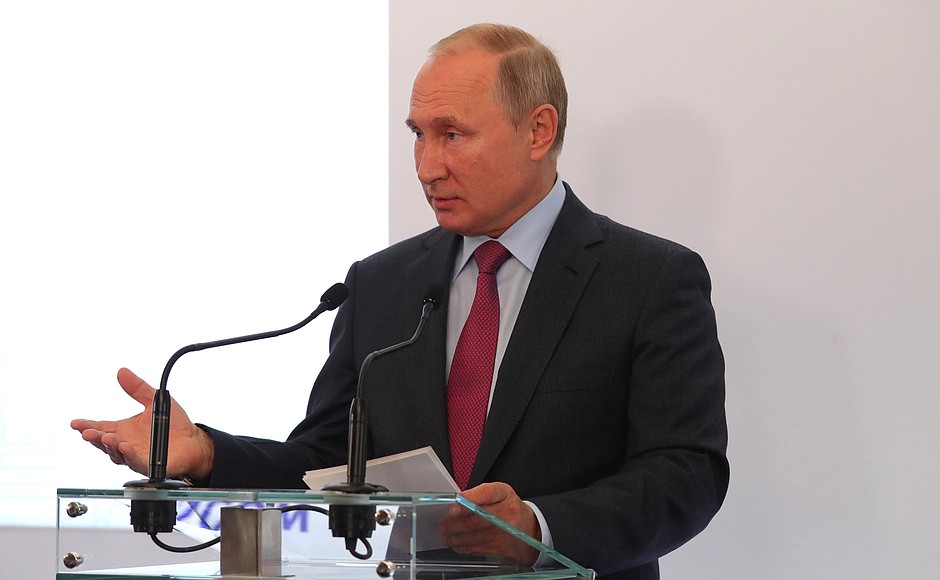Keren Hayesod is an Israeli charitable foundation financing programmes to support various projects in educational, cultural and spiritual and charitable spheres.
* * *
President of Russia Vladimir Putin: Friends, ladies and gentlemen,
I am truly delighted to welcome you all to the international conference of the Keren Hayesod Foundation in Moscow. I am aware that this is not your first day here. I hope you like it. As is well known, your foundation is the oldest. For almost 100 years now, this one of the most influential Jewish organisations has been raising funds to build the Jewish state, to finance programmes to help the Jewish diaspora all around the world, and to support useful international projects in the field of public diplomacy, education, science and culture. I hope you had the chance to see what we are doing here in Russia and Moscow in all these spheres. I was told that you have already been to the Museum of Tolerance and toured our other sites.
The foundation’s leadership includes prominent representatives of the Jewish people, including business people, politicians and religious figures. As I was told, Keren Hayesod regularly hosts conferences in major international capitals. It is gratifying to know that you have decided to get together in the capital of Russia, Moscow. It is important that your foundation does a lot to enhance contacts between the peoples of Russia and Israel, and helps expand cooperation between our countries in politics, economy, cultural and other spheres. Of course such activities are more than welcome.
Importantly, we in Russia pay great attention to developing multifaceted mutually beneficial relations with the state of Israel and we strive to build them in a partner-like and constructive spirit. Without any exaggeration, I can say with pride that probably there has never been such a high level of relations between Russia and Israel, if, of course, we don’t go back to the very first months or maybe the first couple of years of the state of Israel.
Russian-Israeli relations are marked by a substantive political dialogue. I regularly meet with the Prime Minister, Mr Netanyahu; we frequently exchange opinions and consult with each other by telephone, routinely discuss the current and most pressing issues on the global and regional bilateral cooperation agendas.
As you may have noticed, the other day I had the pleasure of receiving Mr Netanyahu in Sochi, in southern Russia. By the way, during our conversation, he told me about his family’s contacts with your organisation. He said that Keren Hayesod is indeed an organisation that enjoys great prestige in the world and that addresses very important, useful and necessary issues.
The Prime Minister also warmly recalled how his grandfather, a rabbi, often spoke at Keren Hayesod meetings. He was an excellent speaker, the Prime Minister said, and his eloquence was even likened to the famous Jewish poet Hayim Bialik. At home, the Netanyahu family still keeps a certificate from the foundation awarded to the Prime Minister’s grandfather for his contribution to your organisation.
Back to Russian-Israeli affairs, I would like to emphasise how important it is to strengthen our bilateral trade and economic ties.
In 2018, trade between Russia and Israel increased by 9 percent. In absolute numbers it is still very modest of course, somewhere around 3 billion. But we are sure that in the near future, we will be able to make progress.
Further increasing the import and export of goods will undoubtedly be facilitated by the conclusion of a free trade agreement with the EAEU, an economic cooperation organisation of the former Soviet states. We are now approaching the final stage – the signing of a free trade document between this organisation (EAEU) and Israel.
Bilateral cooperation in agriculture is also of great significance. Today, work is being done to launch a green corridor to simplify the supply of Israeli agricultural products to the Russian market. A network of dairy clusters using advanced technology is being created in Russia with Israel’s help.
We also see good prospects for developing Russian-Israeli cooperation in science and innovation. Russia is expanding the production of medicines with Israeli licenses. A multifunctional hospital is being planned with the use of Israeli technologies. We also have a cutting-edge technology centre here in Moscow; it’s called Skolkovo.
Russia and Israel support traditionally close cultural contacts. Every year hundreds of thousands of Russians visit Israel and see its cultural and religious landmarks.
Russians and Israelis have ties of family and friendship. This is a true common family; I can say this without exaggeration. Almost 2 million Russian speakers live in Israel. We consider Israel a Russian-speaking country.
Our nations are united by common and often tragic pages in history. In this context, I would like to say that President Rivlin invited me to Israel next January to take part in the events to mark the 75th anniversary of the liberation of the Auschwitz concentration camp and the Day of Commemoration in memory of the victims of the Holocaust. Of course, I will accept this invitation. I said this recently at our meeting with Prime Minister Netanyahu in Sochi. I hope that during this visit, the Israeli leaders and I will also unveil a memorial to the victims of the Siege of Leningrad in Jerusalem, being constructed at the initiative of Israeli veterans organisations.
Well, you know, I must say that when we face negative phenomena, with attempts to revise the results of World War II, to distort history, I must note with pleasure, on one hand, and with concern, on the other hand, that almost the only organisations that publicly opposed all these attempts were Jewish organisations in Europe, including in the Baltic countries. Of course, I always think about this, and I think about it with gratitude, but it is a pity that only they do this. Those people were not afraid to go out and protest, to put on concentration camp prison clothes as a reminder of those events, and take an active open position. Thank you very much for that.
I cannot help but mention with gratitude that your foundation supported the construction of the Victory monument in Netanya, which we unveiled in 2012 with President Shimon Peres. This monument is a tribute to the Red Army soldiers who saved the lives of millions of Jews and liberated Europe from fascism.
We appreciate that the Keren Hayesod foundation does a lot to preserve the historical truth about World War II. It is important to pass on to the next generations the truth about the terrible tragedy of the Holocaust, about the massive losses that our peoples suffered, as well as about the crimes committed by the Nazis against humanity. This is absolutely necessary in order to prevent the growth of anti-Semitism, xenophobia, and religious and racial intolerance in the modern world. The positions of Russia and Israel, the peoples of our countries coincide. We consider any attempt to revise the outcome of the war, to distort the truth and justify fascism and its lapdogs, completely unacceptable.
The more time passes since World War II, the higher responsibility we have, both state and personal, so that the bitter lessons, the actions and the sacrifices are never forgotten. Soon, in May of next year, we will celebrate the 75th anniversary of the great victory together, and of course, we expect the leadership of Israel to accept the invitation and come to the Victory Parade on Red Square and other special events.
Friends, in conclusion I would like to express my gratitude to Keren Hayesod, the participants in today’s forum, for your practical contribution to cooperation between Russia and Israel. May you have a good time in Moscow, in Russia, and good luck.
Thank you for your attention.


